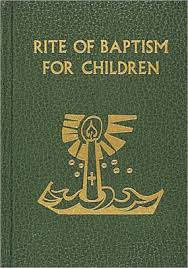
Posted on 08/22/2020 4:09:25 PM PDT by ebb tide
A rogue "permanent deacon" in the Archdiocese of Detroit, Mark Springer, administered invalid baptisms for 13 years. One of them was to someone who would eventually be "ordained" a priest in 2017 -- only to learn he was never validly baptized himself.
 |
| Post-Vatican II vernacular baptism book |
To his credit, the priest -- Father Matthew Hood -- watched a video of his baptism and heard the word "We" instead of "I" used in the vernacular formula, "I baptize thee in the name of the Father and of the Son and of the Holy Ghost." According to a statement issued by the Archdiocese of Detroit today he immediately contacted the chancery. Hood was then validly baptized, and then all of his other sacraments had to be validly administered, since they required a valid baptism to be valid themselves.
That was the easy part.
Now the archdiocese must find every Catholic who received sacraments from Father Hood, as they were administered by a non-Catholic layman!
And, the archdiocese must do the same for all who thought they were baptized by Deacon Springer, as none of those poor people have received any valid sacraments themselves.
What a mess. The use of the vernacular in the Catholic Church's sacraments has yet again proven to be an absolute failure. It is yet another reminder of the importance of Summorum Pontificum, which grants permission to all clergy for the use 1962 books for all sacraments. In Latin.
One positive thing can be seen in this sacramental disaster: a priest and an archbishop (Allen Vigneron) did the right thing upon learning of the invalid baptism on video. How many priests -- and how many bishops -- would have looked the other way?
Ping
There is an amazing amount of lack of sacramental knowledge here.
Yes, it turns out people may have been worshipping a piece of bread—but in good faith. Probably cut down on sacrilegious communions.
Beyond that, the problems will not require a great deal of legwork.
If one confesses all the grave sins that one has committed since one’s last putative confession, the faux confession will be covered if one was not aware that it was faux. Yes his present parishioners should be notified, but that will suffice
One does not have to be baptized to baptize validly, and with marriage the parties are the ministers of the sacrament—since Trent, a designated official with faculties is required under most circumstances to witness, but that is not a problem.
I’d mostly be concerned about confirmation.
Now, as I understand it, in France in the 18th century this happened and the man went on and had apparently received episcopal ordination. That was a royal mess.
I have not heard of that before. Do you have a source?
watched a video of his baptism and heard the word "We" instead of "I" used in the vernacular formula, "I baptize thee in the name of the Father and of the Son and of the Holy Ghost."
Picky, picky, picky.
At least it wasn't "In the name of the Parent, Child and that other whatever."
Is “multis” versus “omnia” also picky?
Can a person’s immortal soul really be jeopardized by someone else accidentally using the wrong word in a language that didn’t exist at the time of Christ?
It wasn’t “accidently” and this is a catholc caucus.
What if the mistake was made in Latin? (How many people could catch it?)
Why do you call it a “mistake”?
It was deliberate.
What if someone deliberately said the wrong words in Latin? (How many people could catch it?)
“We are both human and divine, as Jesus came to reveal and to model for us!”Who are we? We are both human and divine which is what it means to follow Jesus! This is the whole point of the Gospel and the Incarnation! Be part of the promise! God, is living in you, through you. Let go, and let God shine!
I went to a ministry conference last Saturday at Christ the King, offered by the Detroit Catholic Pastoral Alliance. They began with this song and it woke us all up to a New Reality about the all pervasive spiritual identity of Black and African Americans whose spirituality converts their entire existence.
Read Acts 2:38
Read Acts 2:38
Presumably, you don’t have an answer to my question.
It would be invalid.
Anymore stupid questions?
GOOD one.
A very good seminary professor.
One is obliged to confess all the sins that one is aware of since one’s last good confession. Sins that are forgotten by accident (as opposed to deliberately omitted, or not touched upon due to a non-thorough examination of conscience) are covered by the act of contrition—one is sorry for all one’s sins, those mentioned, venial sins and faults not explicitly mentioned, those that one has forgotten, AND THOSE THAT ONE DIDN’T EXAMINE (or mention) BECAUSE ONE THOUGHT THEY HAD PREVIOUSLY BEEN ABSOLVED.
Sorry for shouting, but that is the key point.
The Sacramental System is well-designed, and many flaws end up not having quite as big of ramifications as one might think.
That said, if I were on the jury and the deacon were turned over to the civil arm and burning at the stake were an option . . . one shouldn’t mess with sacraments.
For your further edification:
Disclaimer: Opinions posted on Free Republic are those of the individual posters and do not necessarily represent the opinion of Free Republic or its management. All materials posted herein are protected by copyright law and the exemption for fair use of copyrighted works.